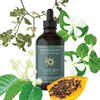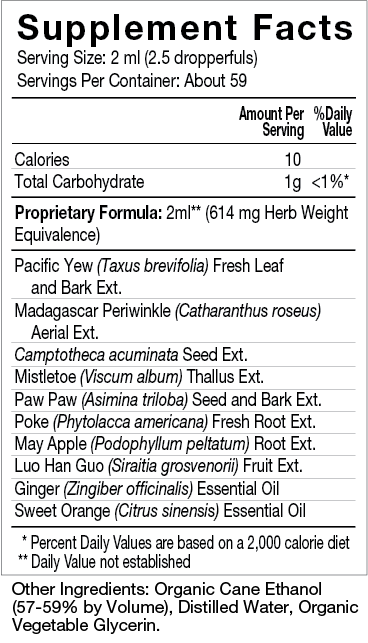Description
 Phyto-Cyto™ activates cellular defense mechanisms to promote normal cell function. This unique herbal compound contains natural Biologic Response Modifiers that increase internal defense responders, including cytotoxic T lymphocytes and natural killer cells. These plant extracts help control microtubule stability, as well as normalize mitochondrial and cytoplasmic production of ATP (cellular energy). In addition, by promoting processes of elimination it naturally assists the body in the disposal of cellular debris.*
Phyto-Cyto™ activates cellular defense mechanisms to promote normal cell function. This unique herbal compound contains natural Biologic Response Modifiers that increase internal defense responders, including cytotoxic T lymphocytes and natural killer cells. These plant extracts help control microtubule stability, as well as normalize mitochondrial and cytoplasmic production of ATP (cellular energy). In addition, by promoting processes of elimination it naturally assists the body in the disposal of cellular debris.*
Key Ingredients







Pacific Yew
Pacific Yew tree bark was traditionally used to impart strength and for a number of other uses by Native Americans. The bark contains a group of unique alkaloids referred to as taxanes that are powerful supporters of healthy immune system function. Modern researchers continue to discover beneficial compounds based on the taxanes found in this tree.*

Madagascar Periwinkle
Rosy periwinkle, often referred to as Vinca rosea, has a long tradition in herbal medicine. The plant contains a group of compounds referred as Vinca alkaloids which are classified as cytotoxics based on their anti-mitotic and anti-microtubule activity.*

Camptotheca
Native to Southern China and Tibet, Camptotheca is known as the Happy Tree or the Tree of Life. Traditional herbalists primarily used the leaves, but also used the bark and stem to help normalize cell activity. The leaves, bark and stem contain an alkaloid, camptothecin, which is found to inhibit topoisomerase I, an enzyme needed for DNA replication.*

Mistletoe
Mistletoe is one of the most popular herbs used in Europe to support healthy circulatory system function. Traditionally, it was employed as a nervine, antispasmodic and circulatory tonic. Mistletoe is found to increase natural killer cells while also protecting and stimulating the immune system.*

Paw Paw
Paw Paw seed and bark include complex compounds known as acitogenins. These compounds, which are derivatives of long-chain fatty acids, are powerful inhibitors of mitochondrial and cytoplasmic production of ATP (energy) in certain cells in the body. Acetogenins have been found to induce apoptosis (cell death) mainly due to necrosis.*

Poke Root
Poke root has been valued for centuries by European and Native American herbalists. It was one of the most common herbs used by the Eclectic herbal practitioners to help support healthy lymphatic system function. It also supports the body’s natural resistance to environmental challenges.*
DOES NOT CONTAIN: Wheat, gluten, soy, milk, eggs, fish, crustacean shellfish, tree nuts, peanuts, sesame
Resources
Product Literature:
Phyto-Cyto Product Data Sheet
FAQs
Q. I noticed Phyto-Cyto contains grain alcohol. Does that mean it contains gluten?
A. No. The distillation process produces 100% purified (or pure) alcohol that contains no grains or trace amounts of gluten.
Description
 Phyto-Cyto™ activates cellular defense mechanisms to promote normal cell function. This unique herbal compound contains natural Biologic Response Modifiers that increase internal defense responders, including cytotoxic T lymphocytes and natural killer cells. These plant extracts help control microtubule stability, as well as normalize mitochondrial and cytoplasmic production of ATP (cellular energy). In addition, by promoting processes of elimination it naturally assists the body in the disposal of cellular debris.*
Phyto-Cyto™ activates cellular defense mechanisms to promote normal cell function. This unique herbal compound contains natural Biologic Response Modifiers that increase internal defense responders, including cytotoxic T lymphocytes and natural killer cells. These plant extracts help control microtubule stability, as well as normalize mitochondrial and cytoplasmic production of ATP (cellular energy). In addition, by promoting processes of elimination it naturally assists the body in the disposal of cellular debris.*
Key Ingredients







Pacific Yew
Pacific Yew tree bark was traditionally used to impart strength and for a number of other uses by Native Americans. The bark contains a group of unique alkaloids referred to as taxanes that are powerful supporters of healthy immune system function. Modern researchers continue to discover beneficial compounds based on the taxanes found in this tree.*

Madagascar Periwinkle
Rosy periwinkle, often referred to as Vinca rosea, has a long tradition in herbal medicine. The plant contains a group of compounds referred as Vinca alkaloids which are classified as cytotoxics based on their anti-mitotic and anti-microtubule activity.*

Camptotheca
Native to Southern China and Tibet, Camptotheca is known as the Happy Tree or the Tree of Life. Traditional herbalists primarily used the leaves, but also used the bark and stem to help normalize cell activity. The leaves, bark and stem contain an alkaloid, camptothecin, which is found to inhibit topoisomerase I, an enzyme needed for DNA replication.*

Mistletoe
Mistletoe is one of the most popular herbs used in Europe to support healthy circulatory system function. Traditionally, it was employed as a nervine, antispasmodic and circulatory tonic. Mistletoe is found to increase natural killer cells while also protecting and stimulating the immune system.*

Paw Paw
Paw Paw seed and bark include complex compounds known as acitogenins. These compounds, which are derivatives of long-chain fatty acids, are powerful inhibitors of mitochondrial and cytoplasmic production of ATP (energy) in certain cells in the body. Acetogenins have been found to induce apoptosis (cell death) mainly due to necrosis.*

Poke Root
Poke root has been valued for centuries by European and Native American herbalists. It was one of the most common herbs used by the Eclectic herbal practitioners to help support healthy lymphatic system function. It also supports the body’s natural resistance to environmental challenges.*
DOES NOT CONTAIN: Wheat, gluten, soy, milk, eggs, fish, crustacean shellfish, tree nuts, peanuts, sesame
Resources
Product Literature:
Phyto-Cyto Product Data Sheet
FAQs
Q. I noticed Phyto-Cyto contains grain alcohol. Does that mean it contains gluten?
A. No. The distillation process produces 100% purified (or pure) alcohol that contains no grains or trace amounts of gluten.
Description
 Phyto-Cyto™ activates cellular defense mechanisms to promote normal cell function. This unique herbal compound contains natural Biologic Response Modifiers that increase internal defense responders, including cytotoxic T lymphocytes and natural killer cells. These plant extracts help control microtubule stability, as well as normalize mitochondrial and cytoplasmic production of ATP (cellular energy). In addition, by promoting processes of elimination it naturally assists the body in the disposal of cellular debris.*
Phyto-Cyto™ activates cellular defense mechanisms to promote normal cell function. This unique herbal compound contains natural Biologic Response Modifiers that increase internal defense responders, including cytotoxic T lymphocytes and natural killer cells. These plant extracts help control microtubule stability, as well as normalize mitochondrial and cytoplasmic production of ATP (cellular energy). In addition, by promoting processes of elimination it naturally assists the body in the disposal of cellular debris.*
Key Ingredients







Pacific Yew
Pacific Yew tree bark was traditionally used to impart strength and for a number of other uses by Native Americans. The bark contains a group of unique alkaloids referred to as taxanes that are powerful supporters of healthy immune system function. Modern researchers continue to discover beneficial compounds based on the taxanes found in this tree.*

Madagascar Periwinkle
Rosy periwinkle, often referred to as Vinca rosea, has a long tradition in herbal medicine. The plant contains a group of compounds referred as Vinca alkaloids which are classified as cytotoxics based on their anti-mitotic and anti-microtubule activity.*

Camptotheca
Native to Southern China and Tibet, Camptotheca is known as the Happy Tree or the Tree of Life. Traditional herbalists primarily used the leaves, but also used the bark and stem to help normalize cell activity. The leaves, bark and stem contain an alkaloid, camptothecin, which is found to inhibit topoisomerase I, an enzyme needed for DNA replication.*

Mistletoe
Mistletoe is one of the most popular herbs used in Europe to support healthy circulatory system function. Traditionally, it was employed as a nervine, antispasmodic and circulatory tonic. Mistletoe is found to increase natural killer cells while also protecting and stimulating the immune system.*

Paw Paw
Paw Paw seed and bark include complex compounds known as acitogenins. These compounds, which are derivatives of long-chain fatty acids, are powerful inhibitors of mitochondrial and cytoplasmic production of ATP (energy) in certain cells in the body. Acetogenins have been found to induce apoptosis (cell death) mainly due to necrosis.*

Poke Root
Poke root has been valued for centuries by European and Native American herbalists. It was one of the most common herbs used by the Eclectic herbal practitioners to help support healthy lymphatic system function. It also supports the body’s natural resistance to environmental challenges.*
DOES NOT CONTAIN: Wheat, gluten, soy, milk, eggs, fish, crustacean shellfish, tree nuts, peanuts, sesame
Resources
Product Literature:
Phyto-Cyto Product Data Sheet
FAQs
Q. I noticed Phyto-Cyto contains grain alcohol. Does that mean it contains gluten?
A. No. The distillation process produces 100% purified (or pure) alcohol that contains no grains or trace amounts of gluten.
Description
 Phyto-Cyto™ activates cellular defense mechanisms to promote normal cell function. This unique herbal compound contains natural Biologic Response Modifiers that increase internal defense responders, including cytotoxic T lymphocytes and natural killer cells. These plant extracts help control microtubule stability, as well as normalize mitochondrial and cytoplasmic production of ATP (cellular energy). In addition, by promoting processes of elimination it naturally assists the body in the disposal of cellular debris.*
Phyto-Cyto™ activates cellular defense mechanisms to promote normal cell function. This unique herbal compound contains natural Biologic Response Modifiers that increase internal defense responders, including cytotoxic T lymphocytes and natural killer cells. These plant extracts help control microtubule stability, as well as normalize mitochondrial and cytoplasmic production of ATP (cellular energy). In addition, by promoting processes of elimination it naturally assists the body in the disposal of cellular debris.*
Key Ingredients







Pacific Yew
Pacific Yew tree bark was traditionally used to impart strength and for a number of other uses by Native Americans. The bark contains a group of unique alkaloids referred to as taxanes that are powerful supporters of healthy immune system function. Modern researchers continue to discover beneficial compounds based on the taxanes found in this tree.*

Madagascar Periwinkle
Rosy periwinkle, often referred to as Vinca rosea, has a long tradition in herbal medicine. The plant contains a group of compounds referred as Vinca alkaloids which are classified as cytotoxics based on their anti-mitotic and anti-microtubule activity.*

Camptotheca
Native to Southern China and Tibet, Camptotheca is known as the Happy Tree or the Tree of Life. Traditional herbalists primarily used the leaves, but also used the bark and stem to help normalize cell activity. The leaves, bark and stem contain an alkaloid, camptothecin, which is found to inhibit topoisomerase I, an enzyme needed for DNA replication.*

Mistletoe
Mistletoe is one of the most popular herbs used in Europe to support healthy circulatory system function. Traditionally, it was employed as a nervine, antispasmodic and circulatory tonic. Mistletoe is found to increase natural killer cells while also protecting and stimulating the immune system.*

Paw Paw
Paw Paw seed and bark include complex compounds known as acitogenins. These compounds, which are derivatives of long-chain fatty acids, are powerful inhibitors of mitochondrial and cytoplasmic production of ATP (energy) in certain cells in the body. Acetogenins have been found to induce apoptosis (cell death) mainly due to necrosis.*

Poke Root
Poke root has been valued for centuries by European and Native American herbalists. It was one of the most common herbs used by the Eclectic herbal practitioners to help support healthy lymphatic system function. It also supports the body’s natural resistance to environmental challenges.*
DOES NOT CONTAIN: Wheat, gluten, soy, milk, eggs, fish, crustacean shellfish, tree nuts, peanuts, sesame
Resources
Product Literature:
Phyto-Cyto Product Data Sheet
FAQs
Q. I noticed Phyto-Cyto contains grain alcohol. Does that mean it contains gluten?
A. No. The distillation process produces 100% purified (or pure) alcohol that contains no grains or trace amounts of gluten.
Description
 Phyto-Cyto™ activates cellular defense mechanisms to promote normal cell function. This unique herbal compound contains natural Biologic Response Modifiers that increase internal defense responders, including cytotoxic T lymphocytes and natural killer cells. These plant extracts help control microtubule stability, as well as normalize mitochondrial and cytoplasmic production of ATP (cellular energy). In addition, by promoting processes of elimination it naturally assists the body in the disposal of cellular debris.*
Phyto-Cyto™ activates cellular defense mechanisms to promote normal cell function. This unique herbal compound contains natural Biologic Response Modifiers that increase internal defense responders, including cytotoxic T lymphocytes and natural killer cells. These plant extracts help control microtubule stability, as well as normalize mitochondrial and cytoplasmic production of ATP (cellular energy). In addition, by promoting processes of elimination it naturally assists the body in the disposal of cellular debris.*
Key Ingredients







Pacific Yew
Pacific Yew tree bark was traditionally used to impart strength and for a number of other uses by Native Americans. The bark contains a group of unique alkaloids referred to as taxanes that are powerful supporters of healthy immune system function. Modern researchers continue to discover beneficial compounds based on the taxanes found in this tree.*

Madagascar Periwinkle
Rosy periwinkle, often referred to as Vinca rosea, has a long tradition in herbal medicine. The plant contains a group of compounds referred as Vinca alkaloids which are classified as cytotoxics based on their anti-mitotic and anti-microtubule activity.*

Camptotheca
Native to Southern China and Tibet, Camptotheca is known as the Happy Tree or the Tree of Life. Traditional herbalists primarily used the leaves, but also used the bark and stem to help normalize cell activity. The leaves, bark and stem contain an alkaloid, camptothecin, which is found to inhibit topoisomerase I, an enzyme needed for DNA replication.*

Mistletoe
Mistletoe is one of the most popular herbs used in Europe to support healthy circulatory system function. Traditionally, it was employed as a nervine, antispasmodic and circulatory tonic. Mistletoe is found to increase natural killer cells while also protecting and stimulating the immune system.*

Paw Paw
Paw Paw seed and bark include complex compounds known as acitogenins. These compounds, which are derivatives of long-chain fatty acids, are powerful inhibitors of mitochondrial and cytoplasmic production of ATP (energy) in certain cells in the body. Acetogenins have been found to induce apoptosis (cell death) mainly due to necrosis.*

Poke Root
Poke root has been valued for centuries by European and Native American herbalists. It was one of the most common herbs used by the Eclectic herbal practitioners to help support healthy lymphatic system function. It also supports the body’s natural resistance to environmental challenges.*
DOES NOT CONTAIN: Wheat, gluten, soy, milk, eggs, fish, crustacean shellfish, tree nuts, peanuts, sesame
Resources
Product Literature:
Phyto-Cyto Product Data Sheet
FAQs
Q. I noticed Phyto-Cyto contains grain alcohol. Does that mean it contains gluten?
A. No. The distillation process produces 100% purified (or pure) alcohol that contains no grains or trace amounts of gluten.










